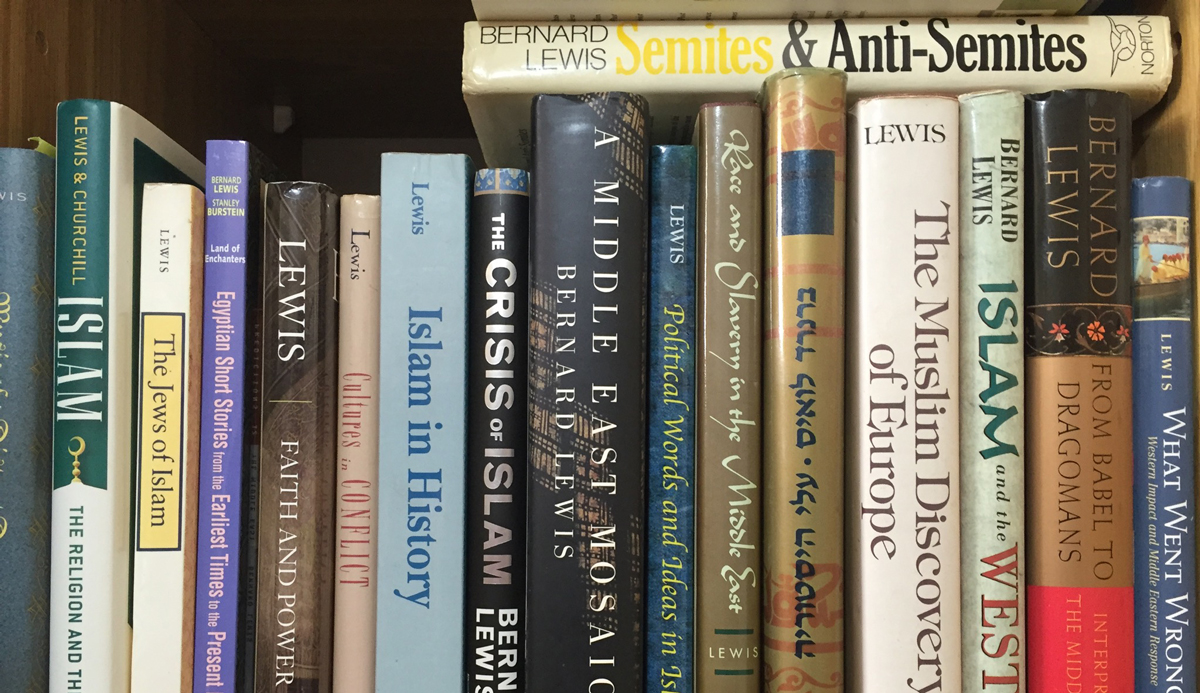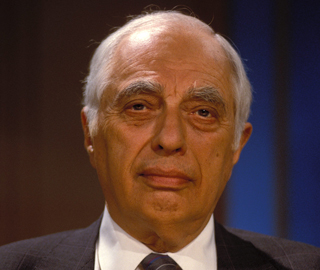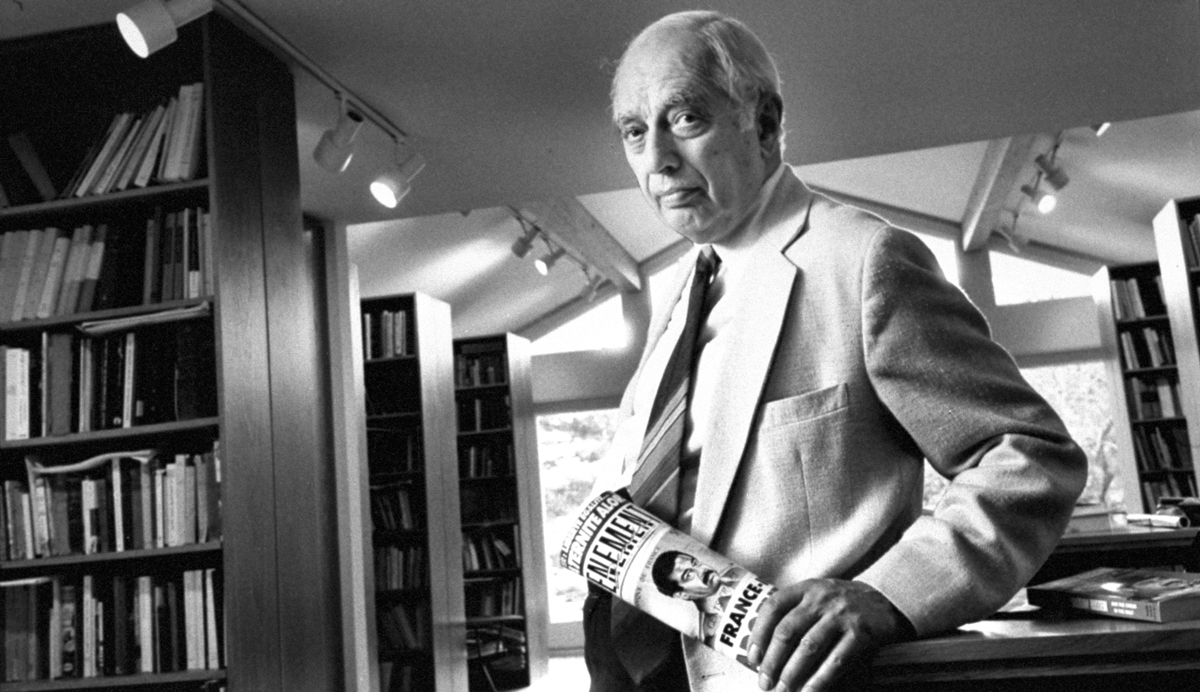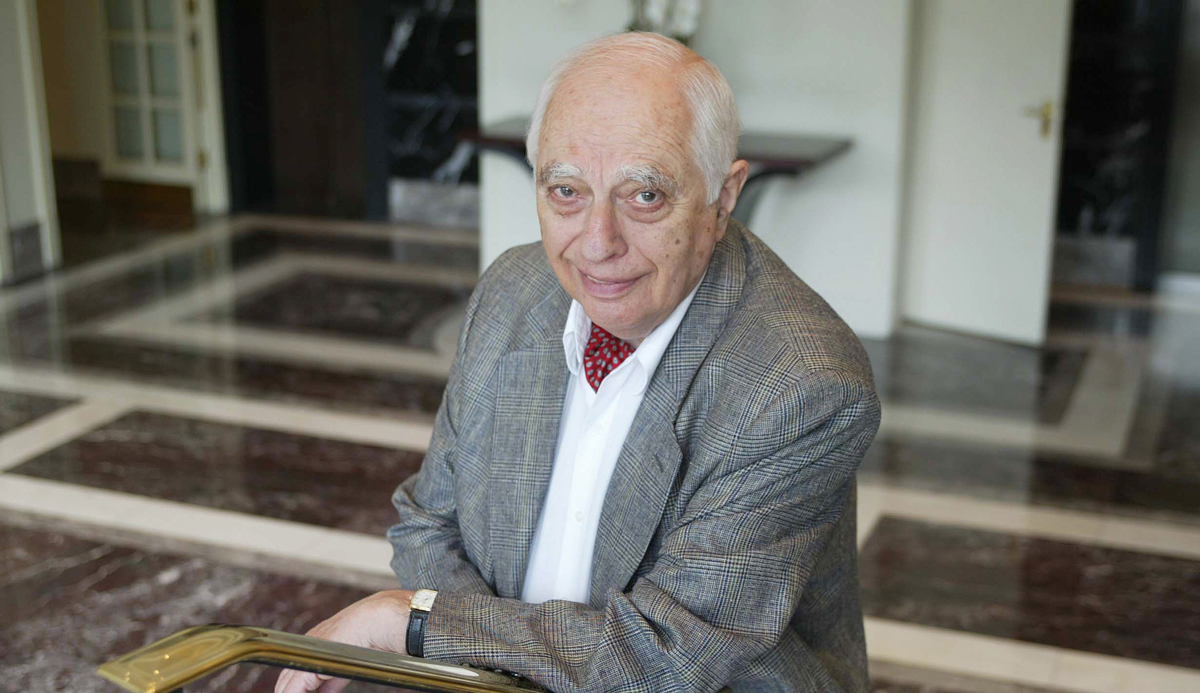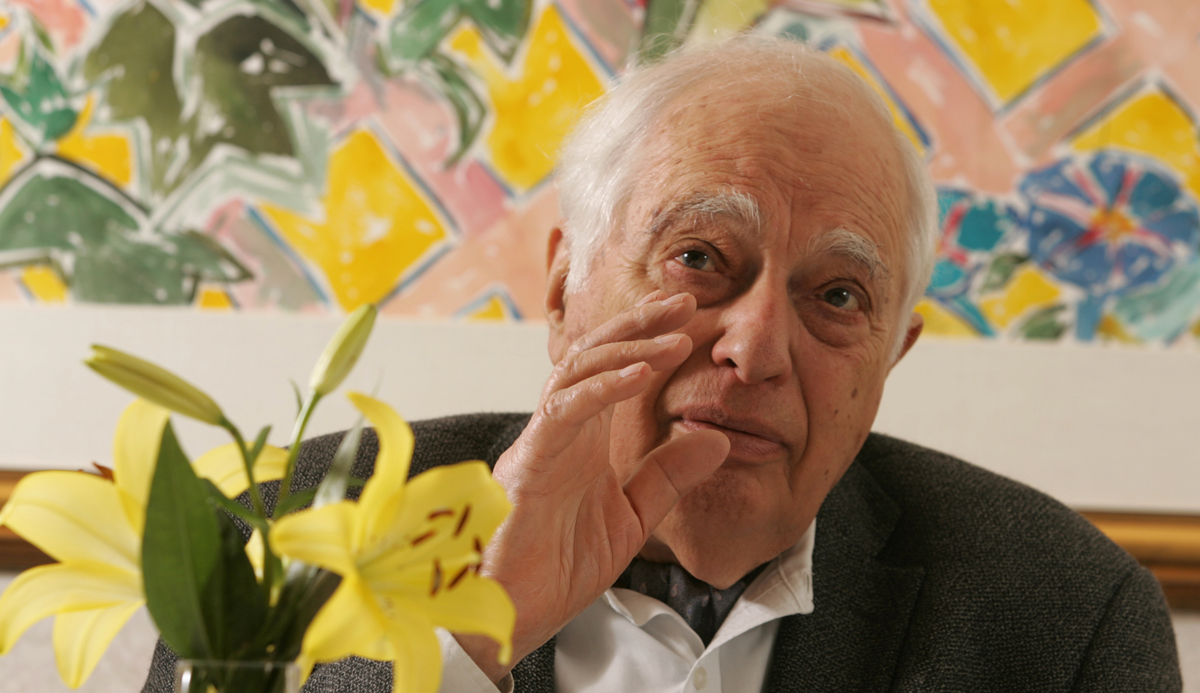It is gratifying that my essay in Mosaic should have prompted such moving tributes to Bernard Lewis from Robert Irwin, Itamar Rabinovich, Eric Ormsby, and Amir Taheri: distinguished scholars and writers whose friendships with him span many decades. And they are but a few of the many admirers who would have eagerly answered Mosaic’s call.
This is all the more remarkable given that Lewis’s own contemporaries are gone. If Bernard is so beloved today by so many, it is because he readily assumed the role of a mentor to the young. I was a case in point, having first enrolled in Bernard’s class at Princeton as a twenty-two-year-old graduate student. He was then sixty, almost two full generations older, but within a month he had set me up with an assistantship, giving me a key to his office at the Institute for Advanced Study and tasking me with cataloguing incoming scholarly offprints. There, working after hours and on weekends, I would sit at his desk, marveling at the sheer volume and variety of the incoming mail and catching glimpses of the correspondence of a scholar with a global reputation.
Every few weeks, Bernard would invite me to lunch at the Institute, followed by a vigorous walk in its surrounding woods. Then would come the high point. Choosing a shelf in his massive library, he would go through it one book at a time, estimating each tome’s significance to scholarship, sharing some lore (or was it gossip?) about its author, and parsing the dedication. I recall his taking up a book by Maxime Rodinson, the French former Communist and scholar of Islam whose political opinions were polar opposites to his. Rodinson had inscribed a warm and affectionate dedication. “He’s a scoundrel,” Bernard said with a twinkle in his eye. “But I like him.”
Such gifts of precious time were hardly mine alone. Over the years, I heard many similar stories from other students, dispelling any illusion that I was especially privileged. (Still, less than two years after we met, he traveled from Princeton to Washington to attend my wedding, and in a fluent Hebrew hand signed the wedding contract as a witness.) His generosity to students and younger scholars assured him a devoted personal following over the course of several generations.
It is fitting that Robert Irwin’s was the first response to my essay. Irwin studied under Bernard at the School of Oriental and African Studies (SOAS) at the University of London, at a time when that school enjoyed a reputation as the mecca of scholarship on the Middle East and Islam. Irwin’s Dangerous Knowledge, a brilliant account of the history of Orientalism, offers an erudite and thorough validation of Bernard’s own defense of the great scholarly tradition of Orientalism against ignorant defamers, of whom Edward Said was the slickest.
Irwin confirms my judgment that Bernard proved singularly prescient when it came to the “return of Islam,” although he believes that the record of Middle East experts in predicting outcomes isn’t particularly distinguished—and that in any case prediction isn’t part of a historian’s job description.
About this, I think Bernard would agree—up to a point. In his memoirs, he explained his view of what a historian could contribute to prognostication:
I don’t think the historian can reasonably be expected to predict the future but there are certain things that the historian can and should do. He can discern trends. He can look at what has been happening and what is happening and see change developing. From this he can formulate, I will not say predictions, but possibilities, alternative possibilities, things that may happen, things that may go this way or that way, in evolving interactions.
This is precisely what Lewis did in his 1976 Commentary article, “The Return of Islam,” which was not so much a prediction as a projection of a discerned trend. Moreover, it was a trend that Bernard had identified even earlier when he insisted that the victory of secular nationalism over Islamic identity might not be as total as some observers believed. Consider, for example, this passage from The Middle East and the West, published in 1964 at the crest of Nasserism and pan-Arab nationalism, and at the lowest ebb of the Muslim Brotherhood:
In recent years, these militant religious organizations appear to have lost ground, and in many countries they have been outlawed or restricted. There can be little doubt, however, that they continue to work in secret, or that they respond to the mood and desires of a great many people among the submerged classes in Islamic society. Even the governments, however modern and secular, have often found it useful or expedient to take account of Islamic sentiments and loyalities.
True, Bernard noted, the Muslim Brotherhood had been suppressed by Nasser in Egypt, but even there “it is by no means extinct.” And then he concluded with this striking passage:
This much is obvious. Of all the great movements that have shaken the Middle East during the last century and a half, the Islamic movements alone are authentically Middle Eastern in inspiration. Liberalism and fascism, patriotism and nationalism, communism and socialism, are all European in origin, however much adapted and transformed by Middle Eastern disciples. The religious orders alone spring from the native soil, and express the passions of the submerged masses of the population. Though they have all, so far, been defeated, they have not yet spoken their last word.
It must be remembered that only six years earlier, Daniel Lerner had published The Passing of Traditional Society: The Modernization of the Middle East, a staple of American syllabi for a generation. There Lerner announced that “what the West is, the Middle East seeks to become.” Only two years before Lewis’s book, similarly, Albert Hourani had published his Arabic Thought in the Liberal Age, assigned reading in every class, arguing that the impact of Western ideas on Muslim identity had been profound and irreversible. Lewis dissented. When he wrote his 1976 article, it wasn’t to declare that Islam had “returned” from oblivion. Rather, it had never been abandoned by the “submerged classes” and “submerged masses” for whom the ideological acrobatics of the would-be “modernizers” were incomprehensible and irrelevant.
How is it that Bernard saw beneath the surface, while Lerner, Hourani, and later Said barely managed to scratch it? Those with a shallow understanding of Islam’s classical and medieval tradition might imagine its legacy swiftly dissipating. For Lewis, as steeped in the study of the same tradition as any learned Muslim, the idea that the masses might throw this tradition overboard at the whim of a few “modernizers” seemed preposterous.
In 1999, in a series explicitly named “Predictions,” Bernard published a slim book entitled The Future of the Middle East. Again, these were not so much predictions as trend-projections. But one of them broke with the consensus, and might well be considered his parting prediction. There Lewis expressed doubt about the staying power of the United States in the Middle East, and the willingness of Europe to take up the slack. But this did not necessarily mean that the Middle East would become, or would remain, a great-power vacuum:
For the moment Russia, crippled by its internal problems, is out of the game. . . . But there can be no doubt that at some time in the near or distant future this will change. A country with the resources and numbers and the scientific and technological sophistication of Russia will not indefinitely remain on the sidelines. Sooner or later Russia will be back, and we do not know what kind of Russia it will be. It may fall subject to some form of totalitarian tyranny, fascist or Communist; it may resume its earlier role as the leader of pan-Slavism or of Orthodox Christianity; it may succeed, after so many failed efforts, in establishing a Russian liberal democracy. It may resume or reject its former imperial ambitions. But this much can be said with certainty: whatever kind of regime rules in a resurgent Russia, it will be vitally concerned with the Middle East—a region not far from its southern frontier, wherever that may ultimately lie, and linked by ties of history, religion, and culture with important elements of the Russian population, including both Jews and Muslims as well as Christians.
“No doubt,” “sooner or later,” “with certainty”: Bernard didn’t hedge this prediction, which flew straight in the face of conventional wisdom but drew on a deep understanding of Russia’s past role in the Middle East, and its complex historical interaction with the Islamic world. Most experts today have been caught off-balance by Vladimir Putin’s bold chess move in Syria. Bernard Lewis isn’t among them.
Itamar Rabinovich is too modest. In his discussion of Bernard’s attachment to Israel and Zionist convictions, Rabinovich fails to underline his own decisive role in bringing him around.
True, everything in Bernard’s personal formation pulled him toward Israel; but everything in his professional world pulled him away. Until the June 1967 Six-Day War, he was circumspect in expressing his personal views about Israel in the Middle East. After the war he became more forthcoming, and was positively liberated after relocating to the United States in the early 1970s. But it was Itamar, a master mentor in his own right, who bound Bernard to Israel by affiliating him with Tel Aviv University. Bernard’s preference for this still-young institution added hugely to its prestige, at a time when it still struggled in the shadow of the Hebrew University of Jerusalem.
Bernard wished for peace between Israel and its neighbors, and Rabinovich in his response tells how Bernard brought news of Anwar Sadat’s eagerness for peace to a doubtful Golda Meir, then Israel’s prime minister. Had she heeded him, perhaps Israel might have been spared the trauma of the October 1973 Yom Kippur War. Or perhaps not: counterfactual history is always open to dispute.
But an indication of Bernard’s integrity arises from a “peace” agreement that did come to pass—namely, the deal between Yitzḥak Rabin and Yasir Arafat, signed on the White House lawn on September 13, 1993. In his report of that event in the New York Times, Thomas Friedman called it “a triumph of hope over history.” When torn between hope and history, as I sought to demonstrate in my Mosaic essay, Bernard sometimes privileged hope. He was among the 3,000 guests on the lawn that day, and he let the excitement carry him away. The handshake between Rabin and Arafat, he would recall in his memoirs, “was truly wonderful.”
But no less remarkable, I would submit, was his later frank admission that it had been a mistake. In January 2002, an Israeli journalist asked him whether he hadn’t once held out hope for the now-ruined Olso process. “You are correct,” Bernard answered. So was he wrong? “Unfortunately, I must admit that I was wrong. . . . The idea of bringing Arafat from Tunis was mistaken.” Bernard then explained why this was so, by reference to the long Palestinian history of miscalculation and rejection.
Of course, he had known all of this history before the agreement, and had even written it up in another article for Commentary, “The Palestinians and the PLO: A Historical Approach” (January 1975). “The PLO,” Bernard wrote there, “refuses to recognize the existence of Israel, and makes little serious attempt to disguise its intention of using any West Bank state of which it may obtain control as a first step toward the realization of its aim—the liquidation of Israel and its replacement by a Palestine state.”
To support the Oslo agreement, then, Bernard had to discount the very history he had written. What was remarkable was his readiness to admit his mistake. Here was the world’s foremost authority on the Middle East, confessing to an erroneous assessment of a matter well within his broad competence. Has a single one of Lewis’s critics made a comparable confession over misplaced hope?
Eric Ormsby is a man of letters who shares with Bernard Lewis an appreciation of Islamic sects, fine poetry, and the fecundity of the English language. He is right to emphasize Bernard’s elegant and precise prose, inspired by the illustrious tradition of English historical writing. Indeed, Bernard has remained monogamous in his love of English and what he has celebrated as its “glorious anarchy.” He could have lectured in a half-dozen languages, and did lecture in French and Turkish when formal protocol demanded it. But he was never one to flaunt his versatility in languages at the expense of precision. “It is only in my mother tongue,” he wrote in his memoirs, “that I can say exactly what I want to say, and in the way I want to say it. In any other language I am restricted and constrained by the limitation of the words and idioms available to me.”
In Israel, many of the older attendees at his lectures used to tell me that they came not only to learn about the advertised topic but for the guilty pleasure of listening to Bernard’s refined speech, which reminded them of their younger years when Palestine conducted its business in the King’s English. While his rise to late-life bestsellerdom depended upon timing, he achieved it no less by virtue of his fluid and flawless English style. (If Bernard had one complaint about his American readers, it was their lack of appreciation for British irony, in which he reveled.)
As Buntzie Churchill, Bernard’s companion, has reminded me, Bernard deliberately disciplined himself to lecture without notes, or else from a single notecard with a few scribbled words. This mastery of extemporaneous speech dramatically accelerated his output after he acquired a dictation device and a budget for transcription. He wrote The Emergence of Modern Turkey (1961) in longhand. But by the time I met him, in 1976, he was dictating virtually everything. He would stack up the books and articles he needed for a session, mark the relevant pages with bits of paper, and jot down a few words to remind him of the direction he wished to go in. The verbatim transcription would be a perfectly crafted and finished product requiring only minor emendations. This feat demanded a range of competencies that few scholars possess, and goes far to explain how he managed, in “retirement,” to belt out a book every year.
In my student days, when I spent hours as Bernard’s office assistant, I would be amazed by the tide of articles and books sent to him by Middle Eastern scholars, all bearing admiring dedications. Amir Taheri does well to remind us of the profound respect for Bernard among serious scholars from the Middle East in the period before Edward Said published his vicious caricature of Orientalism.
Said sought to portray Bernard as disconnected from the Arabs. “Lewis hasn’t set foot in the Middle East, in the Arab world, for at least 40 years,” he announced in 2003. It was a characteristic fabrication: in that time frame, Lewis was a frequent if not annual visitor to Cairo and Amman. (I myself saw him in Cairo in 1979, when I was researching my thesis.) More importantly, Bernard had an array of Arab followers and friends who believed, like Taheri, that “Lewis criticized us because he respected us and, perhaps, even loved us a bit.” A worthy project for an article or thesis would be to go through Lewis’s correspondence and library to map his Middle Eastern networks in full.
On this centenary, one of those admiring voices is lamentably silent. Fouad Ajami, a self-described disciple of Bernard’s, wrote a marvelous encomium a decade ago on Bernard’s ninetieth birthday, and delivered the main tribute at a Tel Aviv University gala thrown for his ninety-sixth. It would take much more space than I have to explore all the aspects of Bernard’s relationship with Ajami (who was also one of my first teachers). Suffice it to say that Fouad exemplified the near-awe with which many Arabs and Muslims regarded Bernard, and himself testified to
the deep reservoirs of reverence felt for [Lewis] in many Muslim and Arab lands. . . . Countless Arab and Iranian and Turkish readers recognize their tormented civilization in what he has written. They know that he has not come to the material of their history driven by bad faith, or by a desire for dominion. They take him at his word, a man of the Anglo-Saxon world, convinced that the ways of the West today carry with them the hopes of other civilizations.
Two summers ago, Fouad passed away at the age of sixty-eight. Had he been with us to offer another tribute on this occasion, it would have surpassed all others; instead, we can only revisit his earlier ones, and mourn the tragedy of a disciple predeceasing his master.
An entire syllabus on the history of the Middle East since the advent of Islam could be compiled exclusively from the writings of Bernard Lewis. (And, so numerous are the translations of his works, it could be done in several languages.) In this respect, he towers above all of his contemporaries and successors and arguably also over his famed Orientalist predecessors, none of whom was trained as a historian. It will be a long time, perhaps generations, before the study of Islam and the Middle East will invite and admit another genius of his caliber.
In the meantime, we have his classic works to guide us through this dark age of obfuscation. There can be no better way to mark Bernard’s centenary than to reread his essays, fill the gaps on one’s shelf of his many books, and revisit his most timeless insights in the light of current events. On his centenary, let us pay homage and offer thanks for the good fortune that has given him to us in such abundance.
More about: History & Ideas, Middle East, Politics & Current Affairs
